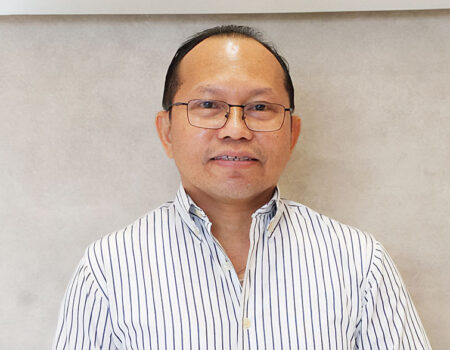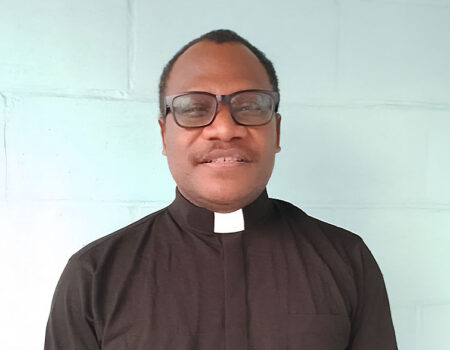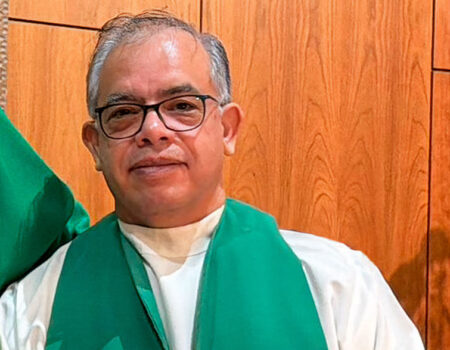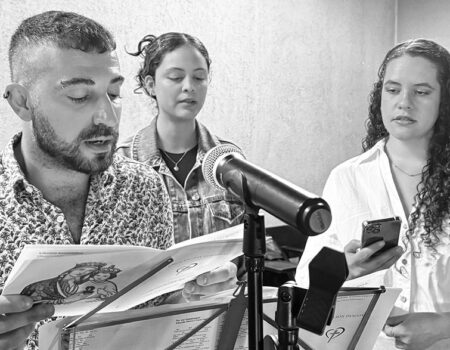Fr Abzalon Alvarado: The Pope in Papua will find a strong and multicoloured Church
Saturday October 11, 2025
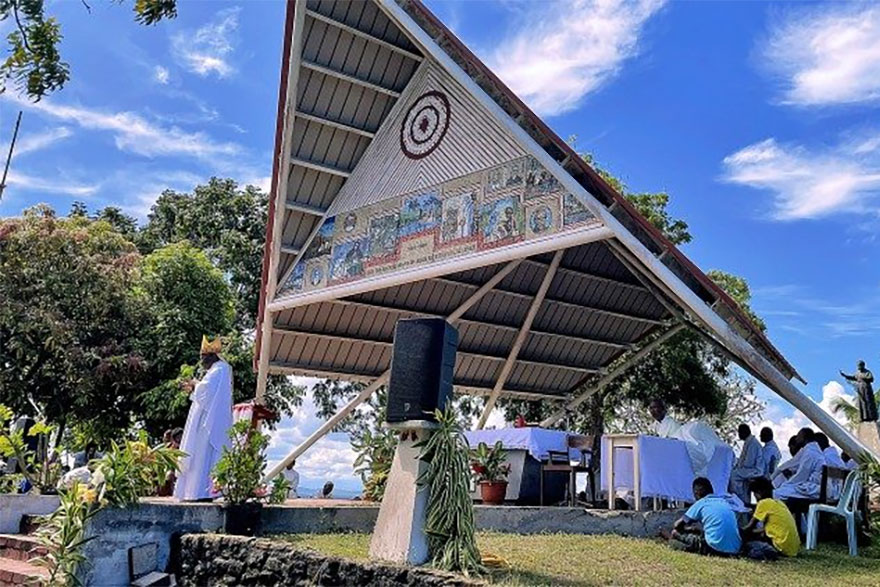
“The origin of the mission in Papua New Guinea, the difficulties of the first proclamation of the Gospel, the current challenges to the Christian community on the island, the emergence of native vocations and the first Papuan Blessed”, are some of the topics at the centre of the interview with Father Mario Abzalón Alvarado Tovar, Superior General of the Missionaries of the Sacred Heart, in view of the apostolic journey of the Holy Father to Asia and Oceania next September.
Collaboration with Vatican News. Renato Martínez
“Pope Francis will find a Church with a lot of faith practice, but in the style of Papua New Guinea, they are very ancestral peoples with very ancient traditions. For them the presence of the Pope is a confirmation of their journey as Church, as people of God”, is how Father Mario Abzalón Alvarado Tovar, Superior General of the Missionaries of the Sacred Heart (MSC), describes the expectations of the Papuan faithful in view of the next apostolic journey of Pope Francis to Asia and Oceania, which he will make from 2 to 13 September 2024.
Origin of the mission in Papua New Guinea. The Superior General of the Missionaries of the Sacred Heart recalled that, they were sent to Papua New Guinea from the time when their founder was still alive, Father Jules Chevalier, and received the missionary mandate at the end of 1878-1879. After a first attempt to settle on the Island from 1881, they celebrated the first Mass on 4 July 1885 and established some missions on the south coast, among the Roro and Mekeo tribes.
“The fact is that from 1881 we came to Papua New Guinea and it is the beginning of the modern era of the Church. Many centuries ago there had been some presence, but very minimal in very, very ancient times, but from 1881 until now we have been present, we are the pioneers of ecclesial growth in Papua New Guinea”.
Papúa Nueva Guinea, “la tierra de lo inesperado”. Asimismo, el misionero guatemalteco describió la realidad de Papúa Nueva Guinea como un mundo multicultural, y a la iglesia presente en estas tierras como una Iglesia multicolor, multilingüe, multiétnica, en todos los sentidos. “Hay un refrán que define a Papúa Nueva Guinea – subrayó el padre Alvarado para describir a Papúa – que es ‘la tierra de lo inesperado’”. Entonces, dijo que es un país con una tradición cultural muy antigua, pero con un ritmo de vida muy distinto al occidental.
“El Papa Francisco, consideró, va a encontrar una Iglesia de mucha práctica de fe, pero al estilo de Papúa Nueva Guinea, de las islas de Nueva Guinea, de la tierra firme, de las tierras altas, de las tierras costeras, son pueblos muy ancestrales con tradiciones muy ancestrales que hay que cambiar el sim card de nuestras cabezas cuando llegamos a Papúa Nueva Guinea”.
The Pope will find a multicultural Church. Referring to the ecclesial reality present in Papua New Guinea, which Pope Francis will meet on his arrival in September, the Superior General of the Missionaries of the Sacred Heart said that it is a Church of many rituals, of many dances, born of a rural world, of jungle, rivers, fishing, hunting, that is, that is the rhythm of the people and that is where they have been sowing the faith.
“We missionaries have a province with more than 115 missionaries, all natives, and there are several congregations in the Church of Papua New Guinea, but it is a very simple people in that sense, but very multicultural, multilingual, multicoloured. It’s difficult to describe it in words, but there is a rhythm of time that proves what we say in missions that, the people have the time and we have the clocks, because for them time is always being. So that’s the great people of New Guinea.
Difficulties in the first proclamation of the Gospel. In this sense, Father Alvarado indicated that among the difficulties the missionaries encountered during the first proclamation of the Gospel was the Papuan culture, which was difficult to understand, such as cannibalism, sanitation, lack of infrastructure and, above all, the cultural and religious world of the Papuans.
“In the beginning, we have to recognise that there were cannibalistic practices, that is no longer there, it has practically disappeared, and that was one of the initial challenges. There were also some very big challenges in terms of health, it was a time of malaria, it was a time of diseases, because they were peoples with almost no contact with the West. The physical difficulty of no roads, no highways. Also the cultural world, our missionaries at the beginning did not fully understand their religious world and they had their practices, their ways, but the Gospel was present of course, the seeds of the Kingdom are always there, and Jesus is there, but with practices that at the beginning it was difficult to agree on things”.
The current challenges of a Church on the way. Currently, the Latin American missionary stressed that a very big journey has been made in Papua New Guinea, and that there is a very strong Church on the island, but that it has to face the challenges that we are facing around the world, such as climate change, mining without a human face, and poverty.
“There is very systemic poverty in Papua New Guinea, being a country with incredibly large natural resources, there is a presence of many international companies that are exploiting the country. Climate change suffers a lot as a country that is very dependent on its natural resources, the fact that there is a lot of logging or large-scale monoculture affects the people. Mining without a human face is affecting people, and that affects the Church very much today, and we are trying to continue to be with the Church at the side of those most in need. And of course, the world of tribes for foreigners or for the Church itself is a challenge, how to respect the tribal or clan structure and how to evangelise from within the tribal structures, respecting and trying to heal the anti-values that exist within all social and ecclesial structures, is a very big challenge because they are structures, they are very different worldviews in the world of tribes, of ethnic groups, and this is a challenge for the Church, for synodality, for the dioceses, for the congregations”.
The first Papuan Blessed and native vocations. Father Alvarado explained that, as a result of the proclamation of the Gospel, several native vocations have arisen among the Papuans, including following the cause for canonisation of Papua New Guinea’s first Blessed, Peter ToRot, a lay Missionary of the Sacred Heart who was martyred in the 45s, as well as very committed people.
“Pope Francis will find bishops, native priests, there are fewer and fewer foreigners who have done great work, but there are still challenges. I’m sure Pope Francis is going to feel them in his heart, because it shows very clearly in Papua New Guinea. And we have Peter ToRot, the first blessed of Papua New Guinea who is a lay Missionary of the Sacred Heart who was martyred in the 45s or so and who is very much followed by the people, we have that cause there and he was beatified in 1995. We have houses of formation with native religious vocations, religious, diocesans, many committed lay people and it is not impossible, but it does require a ‘barefoot’ before a land as sacred as Papua New Guinea and to change our own schemes with which we missionaries arrive, we have to enter into the culture and from there promote the Gospel and that is one of the most certain propositions that the Pope always makes to us missionaries”.
Let us pray for the Pope’s Journey to Asia and Oceania. Finally, the Superior General of the Missionaries of the Sacred Heart invited us to be open to know other realities such as Papua New Guinea and to pray for the upcoming apostolic journey of Pope Francis to Asia and Oceania.
“We have to see the other side of the world too, where there are people who suffer, people who are happy, people who are indigenous, people who have values that we Latin Americans can learn from and share with them too, to be a Latin American open to these other parts of Oceania, Asia, Africa, where the people of God walk, just as in Latin America, just as in Spain. May we pray a lot for this trip of the Pope, the people in Papua New Guinea, in Indonesia, in Timor, in Singapore are waiting for him with open hearts, for them the presence of Pope Francis is a confirmation of their journey as Church, as people of God in Papua New Guinea, concretely. May we continue to walk in synodality in both parts of the world, that would be for me the grace, the mystery of the mission, of the vocation of the Church, it is Jesus who unites us, our Blessed Mother also walks with us”.


